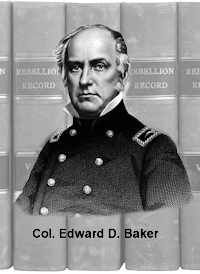March 25.—Washington, North-Carolina, was visited by the United States steamer Louisiana, under the command of Lieut. A. Murray, who reported “that underlying an apparent acquiescence of the people of the town and neighborhood in permitting the building of gunboats and the construction of batteries to repel the approach of the Federal forces, was a deep-rooted affection for the old Union.”—(Doc. 107.)
—Two hundred and thirty rebel prisoners, captured at the battle of Winchester, Va., arrived at Baltimore, Md., this afternoon, and were provided with quarters in the north wing of the new city jail. They are all Virginians, with the exception of five or six Baltimoreans, who left before the war broke out. One of the prisoners, on reaching the quarters, threw up his hat and exclaimed: “Thank God, I am in the United States once more!” Others congratulated themselves at the prospect of getting something good to eat, which they admitted they had not had for some time—N. T. Times, March 26.
—This day the National gunboats Seminole, Wyandotte, and Norwich, under the command of Capt Gillis, senior officer, proceeded up Wilmington River, Ga., and upon arriving within a mile of the Skidaway batteries, dispersed the rebel cavalry stationed there by shell, and then destroyed the batteries. The rebel force fled, leaving everything behind them, even their dinners. Captain Gillis landed and hoisted the American flag on the ramparts. Another flag was hoisted over the rebel headquarters by Acting-Master Steele. The rebel batteries were entirely destroyed, but the dwellings were spared. The dwellings were afterwards burned by the rebels. The batteries mounted ten guns, and were well built. — (Doc. 108).
—Gov. Johnson directed a letter to the officials of Nashville, Tenn., requiring them to take the oath of allegiance, but the Common Council, by a vote of sixteen to one, refused to do so. The sixteen declined on the score that it was never contemplated that that they should take such oath. The one who voted ay, said he would subscribe to the oath, but immediately resign.— Nashville Patriot.



